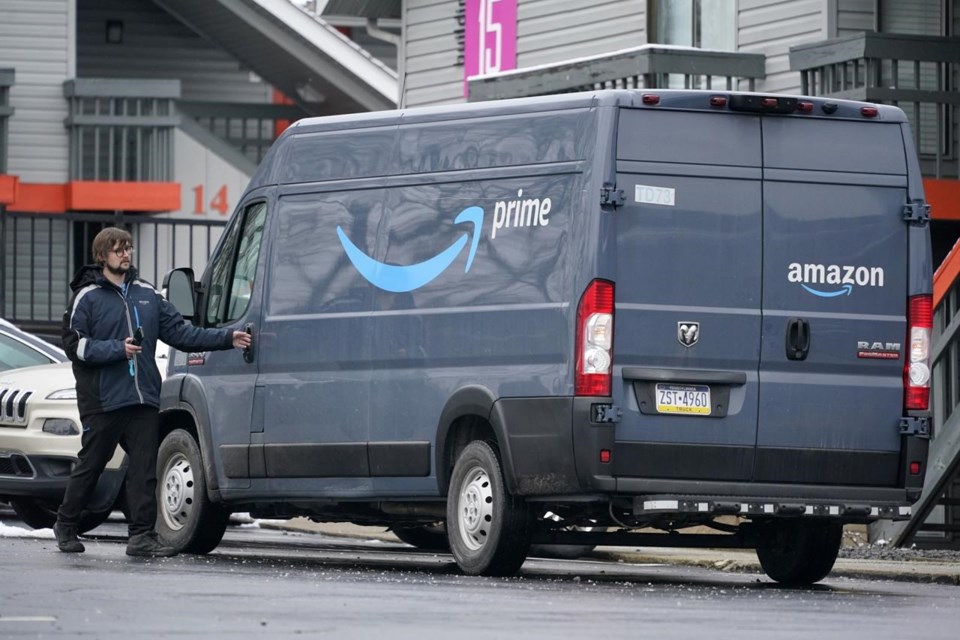MADISON, Wis. (AP) — The Wisconsin Supreme Court on Tuesday let stand a lower court ruling that declared some delivery drivers for Amazon were employees as the state argued, not independent contractors as the online retail giant contended.
The court, in a unanimous decision, said the appeal was “improvidently granted,” meaning the Supreme Court should not have reviewed the case. That decision dismissing the case, issued after the court heard oral arguments, leaves a 2023 Wisconsin appeals court ruling against Amazon in place.
That ruling found that drivers in the Amazon Flex program are a part of the state’s unemployment insurance system and entitled to jobless pay if they are laid off. The decision means an Amazon subsidiary, Amazon Logistics, will likely be hit with a tax bill of more than $200,000.
Justice Ann Walsh Bradley, in a concurring decision, said the reason the court dismissed the case was that further review “would not serve any meaningful purpose” or any “further development of the law.” Justice Rebecca Bradley, in a separate writing, faulted Bradley for trying to explain the court's decision, saying it “will only sow additional confusion.”
The case was closely watched for what effect a ruling would have on workers in the “gig economy.”
Amazon spokesperson Steve Kelly said the retailer was "disappointed that the Wisconsin Supreme Court declined to weigh in and provide much needed guidance on these matters and are determining our next steps.”
Labor unions, along with the state Department of Workforce Development, pushed for the Wisconsin Supreme Court to recognize the Amazon Flex workers as employees.
Stephanie Bloomingdale, president of the Wisconsin AFL-CIO, hailed the court's action, calling it a “win for working people.”
“Far too often, especially in the emerging gig economy, big and powerful companies like Amazon use the misclassification of employees as independent contractors to deny working people essential workplace rights like minimum wages, overtime pay, and unemployment insurance,” she said.
Courts across the country have been grappling with similar questions as states struggle with how to treat workers who are hired for a particular job, often at the push of a button through a smartphone app, to deliver food, groceries, packages or perform a variety of tasks.
“The gig economy is clogging up the court with all of this stuff, all the time,” said Samantha Prince, assistant professor of law at Penn State Dickinson College of Law and an expert on worker misclassification and the gig economy. “It’s just nuts. We really need this stuff to be resolved and stay resolved and stop with all the uncertainty for everybody.”
Prince said the Wisconsin case “will likely resonate through the other gig company court cases.”
“The more cases that find that gig company drivers are employees, the more companies are going to have to pay their rightful share," she said.
Every state has its own laws determining whether workers are employees or independent contractors, Prince said. Those laws set the rules for what wages and overtime the workers must be paid and, in this case, whether they are subject to unemployment benefits that the employer must contribute toward.
Employees who got approved for the Amazon Flex program could download an app for their personal phones showing blocks when they could deliver packages for the company. Workers would scan packages at the Amazon warehouse in Milwaukee and use their personal vehicles to deliver them, using a route suggested by Amazon.
After one Amazon Flex worker was fired, he filed for unemployment insurance. The Department of Workforce Development conducted an audit of more than 1,000 Amazon Logistics drivers between 2016 and 2018 and concluded the vast majority of drivers were employees, not independent contractors, and therefore eligible for unemployment insurance payments. The state told Amazon in 2018 that it owed more than $205,000 in unemployment insurance premiums.
The Wisconsin Labor and Industry Review Commission upheld the state DWD determination that the drivers were employees. Amazon Logistics sued and a Waukesha County circuit court judge ruled the drivers were independent contractors. Last year, the Wisconsin Court of Appeals overturned that ruling, agreeing with the state that the drivers were employees. That set up the appeal to the Wisconsin Supreme Court.
Many other states have looked at the issue.
A Virginia appeals court ruled in 2023 that Amazon Flex drivers were employees, not independent contractors, and ordered Amazon to pay unemployment insurance taxes and penalties.
A California state appeals court last year said app-based ride-hailing and delivery companies like Uber and Lyft can continue to treat their California drivers as independent contractors, allowing them to bypass other state laws requiring worker protections and benefits.
The U.S. Department of Labor enacted a new rule March 11 that aims to prevent the misclassification of workers as “independent contractors,” a step that could bolster both legal protections and compensation for millions in the U.S. workforce. That rule applies to wages and overtime, but not unemployment compensation.
Scott Bauer, The Associated Press




